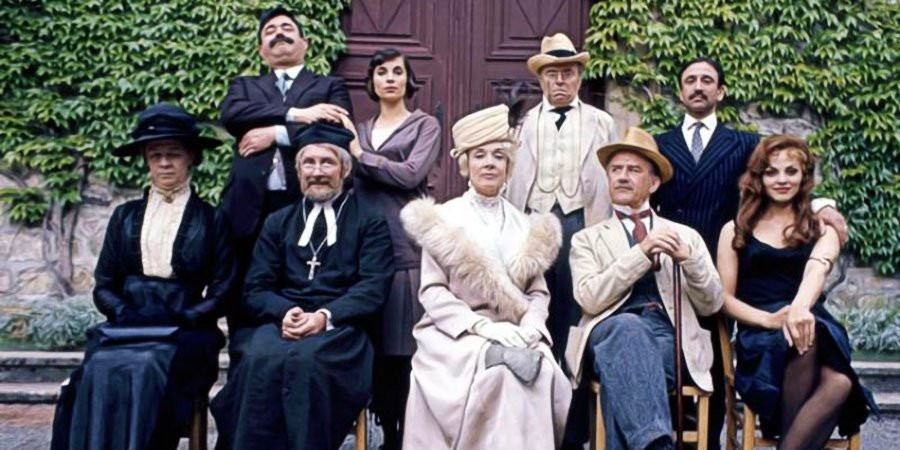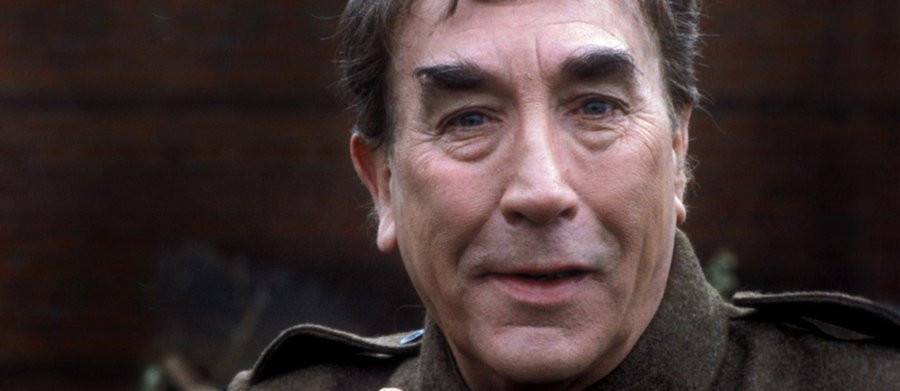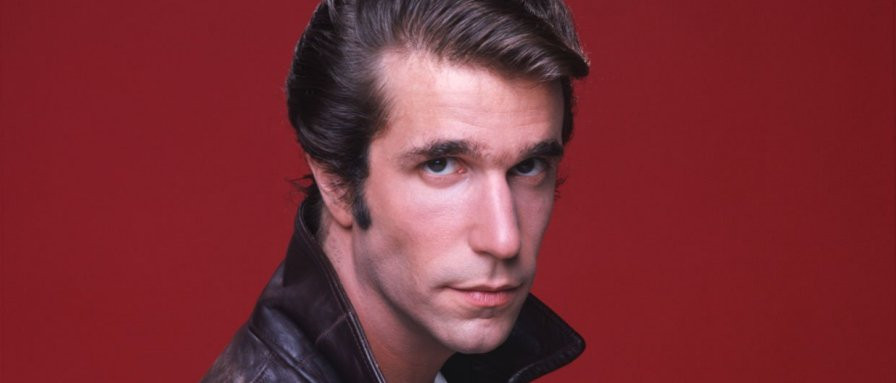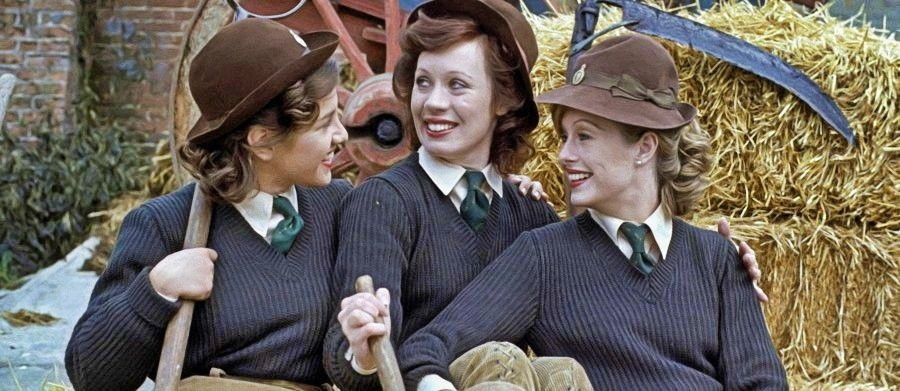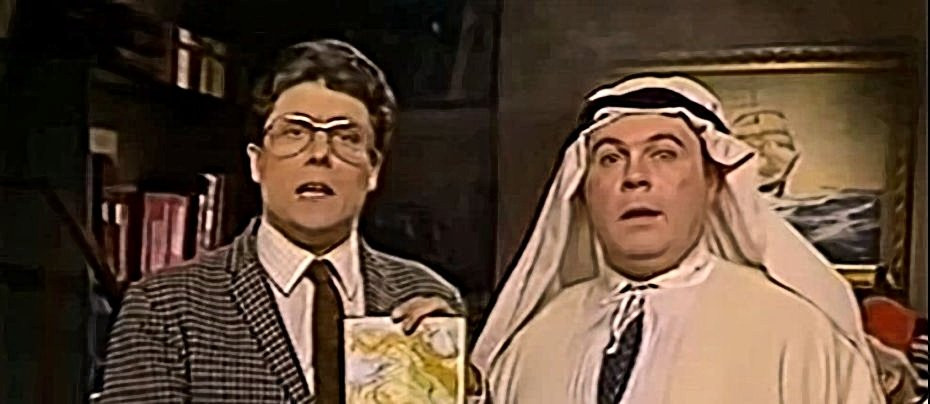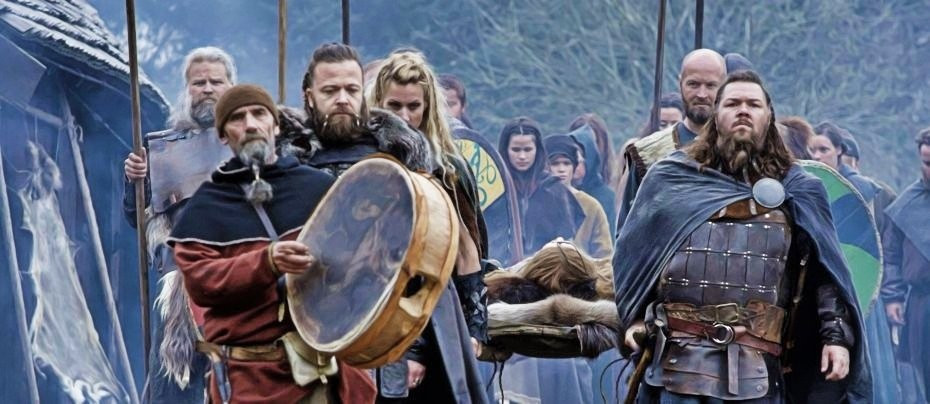
Vikingane / Norsemen
2016 - NorwayIt was the Mafia comedy 'Lilyhammer,' along with feature films such as 'Trollhunter' and 'In Order of Disappearance,' that really introduced the world to Norway's unique sense of humour. Terse, straight faced, slightly surreal, and dark as a December night in Svalbard, there are traces of the same grim wit found in the old Viking Sagas, Norway's other great cultural export.
One cannot help wondering if the Norwegians might have been slightly miffed that a combination of Irish and Canadians beat them to making a globally successful drama series about the Vikings. True, the Vikings visited Ireland and Canada, among many other places, but they came from Norway, or at least many of them did, including some of the most famous names, and they remain central to Norwegian heritage.
A Norwegian satire on 'Vikings' was therefore a fairly obvious proposition. The way they went about it has been anything but obvious. The script sometimes feels like the result of a long, Viking level drinking session on one of those cold Winter nights there. As such, it is nothing if not entertaining, even if it sometimes lacks polish and some bits are not as funny by the cold light of day as they probably seemed when first suggested.
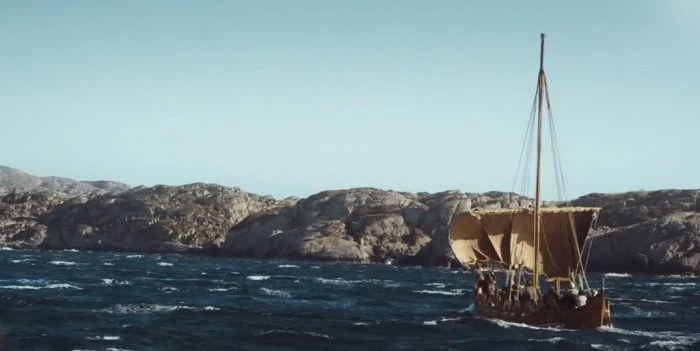
Just as 'Vikings' started out by concentrating on a single small community, 'Vikingane,' known in English as 'Norsemen,' introduces us to the stereotypical Dark Ages village of Norheim. In both productions, everything changes when someone has the bright idea to sail West on their raids, to the rich territory of England, rather than East, as usual, to the Baltic, which has been reduced to poverty by the constant raiding: in 'Norsemen' the inhabitants have become too apathetic even to rebuild between raids - a joke in which there might be a great deal of historical truth.
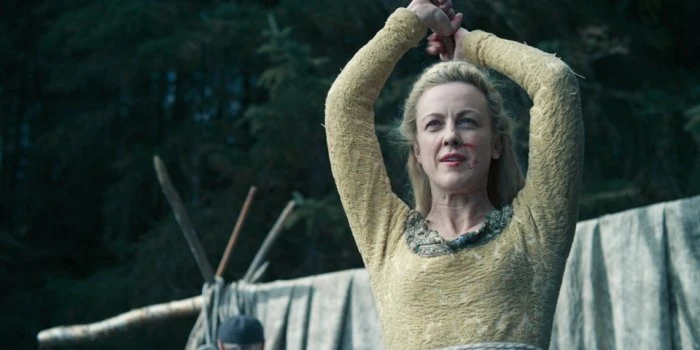
Where 'Vikings' goes on to expand to become an epic spanning three continents, 'Norsemen' remains essentially a village "soap opera." Olaf (Henrik Mestad), the village chieftain, is the epitome of the classic Viking war leader, a formidable looking warrior with a serious demeanour which reflects his high sense of responsibility. His wife Hildur (Marian Saastad Ottesen) has an equally high sense of her own dignity as "First Lady of the Village" and is ruthless in defending it.

Olaf's unmanly brother Orm (Kare Conradi) is married to tough shield maiden Froya (Silje Torp), possibly the worst person in the world for him: she is a great warrior who joins the men on raids while he prefers to stay at home, where he cultivates a very un-Viking interest in the arts. Froya obviously has more in common with Arvid (Nils Jorgen Kaalstad), Olaf's easy going second in command, especially when they bond over their shared interest in killing people. However, Arvid also makes an ill advised marriage, to Liv (Kristine Riis), a social climber who shares Hildur's ruthlessness and her love of power - to the extent of being sexually aroused by it.
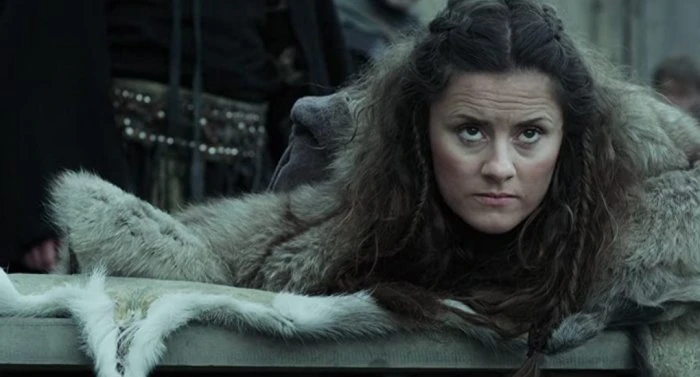
Incidentally, to add to complexity, in real life Kaalstad is married to Ottesen. It is also worth noting that many of the cast, including most of the principals, are 'Lilyhammer' veterans.
Further complications arise from outside the village in the form of Jarl Varg (Jon Oigarden), the psychopathic local Earl, and Rufus (Trond Fausa Aurvag), an arrogant actor from Rome who is captured as a slave on a raid and who becomes Orm's cultural adviser.

About ninety per cent of the humour comes in the form of 21st Century attitudes being put into the mouths of 8th Century people. Sometimes they talk of concepts of which they say they do not have a word for it yet. This is usually delivered in the Laconic style of the Viking Sagas, but sometimes a character, usually Orm, is allowed to be more garrulous. If this makes 'Norsemen' something of a one-joke show, it is a good joke, satirising our times as much as the Vikings.
It has to be said that the script is sometimes in danger of being a bit repetitive and there are scenes, especially in the first season, that could have been tighter. Orm in particular, although a good comic character, can become wearing very quickly when allowed to go on too much.
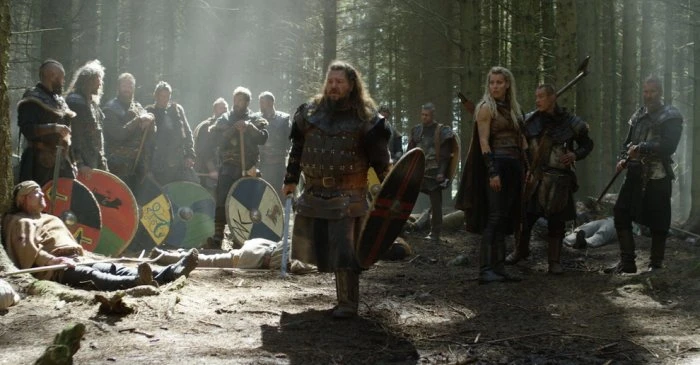
The tone of the piece will not be to everyone's taste. The sexual references, violence, and bad language can be graphic. As in 'Lilyhammer,' the darkness of the humour, and the sudden transition between humour and violence, may leave some viewers wondering what they are meant to be feeling. There a lot of "Are we supposed to be laughing at this bit?" moments.
One cannot imagine an American production these days making jokes about rape, slavery, and homosexuality as 'Norsemen' does. It is being forgotten that part of the purpose of humour is to release social tension and to tell important but difficult truths indirectly. In the case of 'Norsemen,' the point is made very clearly that, if we are tempted to like the characters too much, we must not forget that the Vikings were truly ghastly people.
They treated their slaves appallingly. We see this mainly from the perspective of the amiable Kark (Oystein Martinsen), a slave who was freed and then decided to return to servitude out of a sort of Stockholm Syndrome - one of those concepts for which the characters in 'Norsemen' do not have a word yet. We also meet, very briefly, a particularly Christian Christian called Charlie at a fundraising dinner for an English children's hospital - after he spent the morning volunteering at the animal shelter and just before his brutal murder by our supposed heroes.
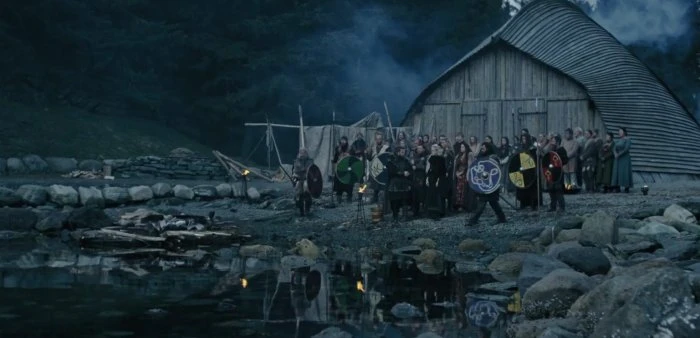
That is what the Vikings did. They destroyed what better people built, and inflicted great suffering on them for no better reasons than personal profit and infantile enjoyment of the act. Apologists for the Vikings suggest they had to raid because their own land was so poor. 'Norsemen' shows that there were other reasons for the poverty. A man who has worked hard to become prosperous is effectively murdered in a 'holmgang,' a judicial duel, by the experienced warrior Arvid, who wants his farm and his wife. It seems the people of Norway themselves asked the same question as the people they raided: what is the point of working hard to build anything if someone else can take it so easily?
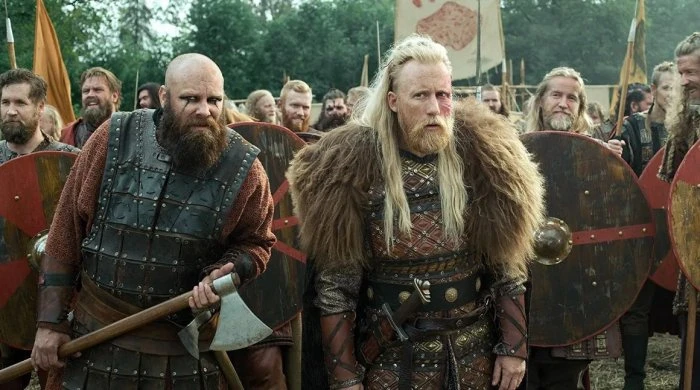
This point is expanded in a later subplot about a peasants' revolt led by the identical twin brother of the man Arvid killed in the 'holmgang' (played by the same actor, Nikis Theophilakis). This is in response to Arvid levying "protection money" - making no secret of the fact that it is exactly the same as taxation. Predictably, not least because it happened to most peasants' revolts throughout history, the inexperienced peasants are slaughtered very efficiently by the much smaller number of trained professional warriors who have been oppressing them. This is the reality of warrior cultures, but 'Norsemen' then goes on to illustrate another reality of such cultures. Gloating over their easy victory, the warriors realise there is no one left to do the farming and pay them taxes/protection money. They are therefore forced to spare the only survivor of the revolt - who just happens to be its leader, who made the wise decision to command from the rear.

The comedy of 'Norsemen' therefore delivers a number of important historical and even political points that more serious productions usually ignore.
It also has a nice line in satirical references. 'Vikings' is the most obvious source, to the extent that Thorbjorn Harr, who played Jarl Borg in 'Vikings,' turns up in 'Norsemen' playing a strangely similar character called Jarl Bjorn. There are also a number of references to 'Game of Thrones,' and to feature films including 'Lord of the Rings,' 'Conan the Barbarian,' 'Gladiator,' 'Braveheart,' and, of course, 'The Thirteenth Warrior.'

The production benefits enormously from the Norwegian scenery, and from being based in the historic village of Avaldsnes, where there are replicas of Viking buildings at the Nordvegen museum. Great effort seems to have been made to get period details right, including those crazy Viking customs and laws, even if their application is sometimes exaggerated for comic effect. Following the precedent of Welsh bilingual productions, most scenes were filmed twice, once in the local language, in this case Norwegian, for the domestic market, and then again in English for international sale. The English spoken by the Norwegian cast is faultless.
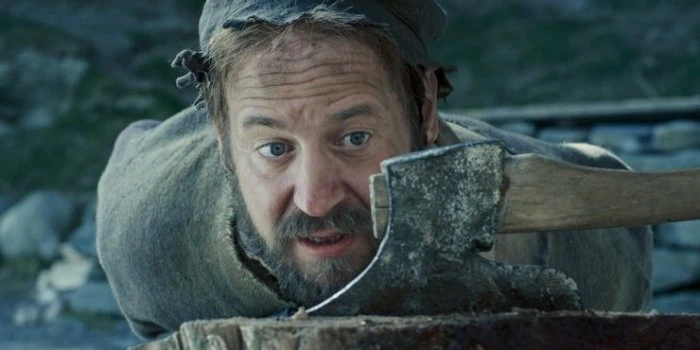
Like 'Lilyhammer,' it achieved great domestic success, with a fifth of the population of Norway apparently tuning in to the first season, but the oddball combination of humour and extreme violence seems to have confused the wider audience, even if those who liked it often liked it a lot. More seems to have been invested in the second season, which was certainly smoother and tighter than the first, but by the end of it the writers had rather written themselves into a corner. The decision was therefore taken to make the third season a "prequel" to the first. Unlike most prequels, the third season meshes very well with the events of the first and second, so that one wonders if this was the plan all along, or if at least part of the third season was written before the first. Either way, one can watch the seasons in the order 3-1-2 as easily as 1-2-3. The third season was also the best made in every respect, everyone having found their groove by that point. This makes it doubly sad that it was also at this point that the show was cancelled.
A deliberately eccentric show, 'Norsemen' has its flaws. It is certainly not for everyone. Even for those who share the writers' tastes, the balance between its realism and its absurdity, like that between its comedy and its violence, can sometimes seem a bit off. Yet if you are the sort of person who would enjoy nine solid hours of the sort of anachronistic attitudes that abound in Monty Python's historically themed films and sketches, 'Norsemen' is definitely for you.
John Winterson Richards' website can be found here: John Winterson Richards
Seen this show? How do you rate it?
Seen this show? How do you rate it?
Published on November 9th, 2021. Written by John Winterson Richards for Television Heaven.


